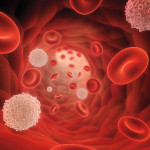Invectys, a French startup that spun-off from the Institut Pasteur in Paris, has secured $17 million (€15 million) in equity funding to support an ongoing Phase II study of a DNA vaccine for chronic lymphocytic leukemia (CLL), the company announced last week.
CLL, the most common form of leukemia in adults, involves overproduction of white blood cells, usually antibody-producing B cells. As abnormal cells grow out of control in the bone marrow and enter the bloodstream before they’re fully mature, they can crowd out functional blood cells. Nearly 21,000 people will be diagnosed with CLL and about 4,500 will die from it this year, according to the American Cancer Society. CLL can sometimes be put into remission, but it is difficult to cure.
The INVAC-1 vaccine targets telomerase, an enzyme that plays a role in cancer cell growth. Engineered to carry DNA that encodes an inactive version of the enzyme, the vaccine trains immune cells to recognize and target telomerase in cancer cells. Unlike existing therapies, these trained immune cells can enter and attack cancer in the bone marrow.
Telomerase is not a new target. The Korean company GemVax & Kael has a telomerase vaccine called Riavax that is approved in Korea to treat locally advanced or metastatic pancreatic cancer, according to FiercePharma.
INVAC-1 is injected into the skin. A process called electroporation is used to make the telomerase DNA more bioavailable, a problem with previous attempts at this type of therapy.
A previous Phase I trial found that INVAC-1 was safe and well tolerated and helped stabilize people with advanced cancer, according to the Invectys press release.
The open-label Phase II trial, underway at the University of Texas MD Anderson Cancer Center in Houston, is currently recruiting participants. Patients in one arm, who have indolent or slowly progressing disease and are not considered eligible for existing therapies, will receive INVAC-1 alone. Those in the second arm will receive the vaccine plus Imbruvica (ibutinib), a kinase inhibitor currently approved for CLL and other blood cancers.
Invectys said it is also planning additional trials, including pairings with PD-1/PD-L1 checkpoint inhibitor immunotherapy.
“It is really exciting to move into a Phase II clinical trial, especially at the MD Anderson Cancer Center, the world’s foremost hospital for cancer therapy,” said Invectys cofounder and CEO Pierre Langlade-Demoyen. “Products like INVAC-1 are poised to emerge as mainstream components to combination immune-oncology regimens.”







Comments
Comments